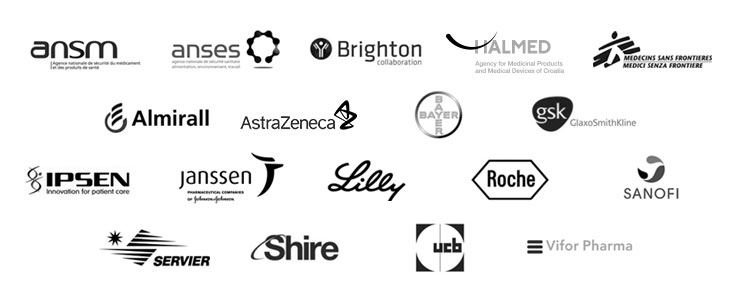Quality Indicators
Key figures (Sep 2011 - Sep 2025)
Read more
Read more
Read more
Some former students' testimonials
This Eu2P program is very well-structured to meet all your learning needs in the pharmacovigilance and pharmacoepidemiology field. I highly recommend it to both students and professionals.
Full quote
I highly recommend it to professionals in the pharmaceutical and regulatory sectors due to its unique integration of both public and private sector perspectives.
Full quote
I would definitely recommend the Eu2P program. It is well structured and flexible making it a great option for working professionals.
Full quote
I highly recommend this program to professionals seeking a comprehensive and industry-relevant education in the field.
Full quote
Eu2P provided top-tier training from global experts, allowing me to apply what I learned to my country's context.
Full quote
There is no doubt that the Master of Science in Pharmacovigilance and Pharmacoepidemiology garnered through Eu2P is able to transform careers and it is highly recommended for working professionals.
Full quote
Organisations trusting us for staff competency development

Education Excellence
- Job-oriented courses
- Made flexible
- With genuine academic quality
- Real-life practices inputs from insiders such as the regulatory and industry members of the Eu2P consortium and from international guest experts invited to share experience and interact with students
- Course compliance with the core competencies and knowledge requirements such as WHO-ISoP requirements for pharmacovigilance and ISPE requirements for pharmacoepidemiology and with the imi-train competency profiles in Drug Safety Sciences
- Inclusion of last research and methodologies advances in collaboration with the IMI PROTECT stakeholders
- The full online courses approach to ease professional study-time management has been awarded a trophy for higher education innovation (Educatec-Educatice 2012)
- Modular and time flexible courses comply with lifelong learning and continuing professional development as described by the LifeTrain initiative
- Academic standards and quality of the programme are ensured by the Eu2P Executive Board including academic representatives of the 6 Eu2P degree awarding universities
- Compliance with main quality items of ENQA's report on "Standards and Guidelines for Quality Assurance in the European Higher Education Area"
- Cross quality review of assessments between Eu2P academic partners
- Independent external examination of programme assessments and equity
Recommendations & collaborations

Eu2P training programme is recommended by the ENCePP as important in building future capacity in the European Union to undertake high quality, scientifically independent research
.
Read more

The North America chapter from the International Society of Pharmacovigilance (NASoP) has collaborated with Eu2P to build a new education program tailored to North American medicines-stakeholders, the American Program in Pharmacovigilance Am2P.
Read more

The Eu2P academic partners have been selected to design and develop the Pharmacoepidemiology and Real-World Evidence (RWE) online course programme within the EMA Big Data training curriculum for both EMA and EU Regulatory network members.
Read more

IMI PROTECT project and Eu2P fostered collaboration in postgraduate training and exchange of trainees between pharmacovigilance and pharmacoepidemiology centres. PROTECT has also provided pharmacoepidemiological research findings and new methodology inputs for Eu2P teaching materials and programmes.
Read more

Eu2P training programme has been awarded a PharmaTrain Centre Recognition following a quality assessment of its Master Education and Training programme by The PharmaTrain Federation.
Read more

IMI EMTRAIN's On-course®, the European portal of biomedical postgraduate education and training resources has indexed Eu2P courses and provides a Eu2P course filter in its Advanced Search feature.
Read more

IMI SafeSciMET has collaborated with Eu2P to adapt course modules into a blended learning format on the Eu2P eLearning platform under the collaborative framework of the imi-train project.
Read more

IMI European platform for education and training in the medical, biomedical and pharmaceutical sciences, imi-train, promotes Eu2P academic postgraduate programmes as well as CPD training in pharmacovigilance and pharmacoepidemiology.
Read more
Publications & media highlights
- Training and Capacity Building Opportunities in Pharmacovigilance (in Special Issues in Pharmacovigilance in Resource-Limited Countries).
Palin K, Liège S, Naboulet C, Salvo F.
In: Ahmad, S.R. Special Issues in Pharmacovigilance in Resource-Limited Countries. Springer Nature Singapore (2025). - The American Program in Pharmacovigilance (Am2P): a new accredited online training program in pharmacovigilance and pharmacoepidemiology.
Kugener V, Palin K, Salas M, et al.
Therapeutic Advances in Drug Safety (2024). - Collaborative Approaches to Establishing and Implementing Pharmacovigilance Systems. .
Edwards, B., Caro-Rojas, A.
In: Jose, J., Cox, A.R., Paudyal, V. (eds) Principles and Practice of Pharmacovigilance and Drug Safety. Springer, Cham (2024). - Current career situations of Chinese pharmacovigilance professionals working for pharmaceutical companies: an exploratory survey.
Tang et al.
BMC Health Serv Res (2023). - Training Opportunities for a Career in the Pharmaceutical and Biomedical Industry.
Thomas, J.R.
In Career Options in the Pharmaceutical and Biomedical Industry. Springer, Cham.(2023). - European Regulatory Science and Regulatory Science Expert Training Project .
Shin et al.
Korean Journal of Clinical Pharmacy (2021). - A Multidisciplinary Approach in Pharmacovigilance Awareness: ISoP Egypt Chapter's MedSafetyWeek Experience.
Rostom et al.
Drug Safety (2021). - A systematic review on learning outcomes of pharmacovigilance issues: Undergraduates of pharmacy.
Pires C.
International Journal of Educational Research (2021). - Global Pharmacovigilance, challenges, and future considerations: West globe and East globe.
Gadhade JS, Hiray RS.
Journal of Pharmacovigilance and Drug Research (2021). - Drug safety academic programme expands to North America.
Innovative Medicines Initiative (2021). - For research projects to leave a legacy, long-term vision is vital.
Innovative Medicines Initiative (2021). - An Update of the North American Chapter of the International Society of Pharmacovigilance (NASoP).
Gossell-Williams, M. et al.
Drug Safety (2021). - Socio-Economic Impact Report on IMI1 projects.
Centre for Innovation in Regulatory Science (2021). - Chapter 23 - Translational safety medicine.
Ernst et al.
Principles of Translational Science in Medicine (Third Edition 2021). - Harmonizing and improving European education in prescribing: An overview of digital educational resources used in clinical pharmacology and therapeutics.
M. J. Bakkum et al.
British Journal of Clinical Pharmacology (2020). - Pharmacovigilance: Challenges in Getting From Here to There.
P. Beninger
Clinical Therapeutics (Dec. 2018). - Pharmacovigilance: Our experience in Aden.
M. Alshakka and W. Badulla
World Journal of Pharmaceutical Sciences (Oct. 2018). - A Review of the Contributions of Cross-discipline Collaborative European IMI/EFPIA Research Projects to the Development of Replacement, Reduction and Refinement Strategies.
S. Wolfensohn
Alternatives to Laboratory Animals (May 2018). - Enhancing Pharmacovigilance Capabilities in the EU Regulatory Network: The SCOPE Joint Action.
A. Radecka, L. Loughlin, M. Foy, M. Viana de Ferraz Guimaraes, V. Macolic Sarinic, M. Dimov Di Giusti, M. Lesicar, S. Straus, D. Montero, J. Pallos, J. Ivanovic, J. Raine
Drug Saf (2018). - What Future Healthcare Professionals Need to Know About Pharmacovigilance: Introduction of the WHO PV Core Curriculum for University Teaching with Focus on Clinical Aspects.
R. van Eekeren, L. Rolfes, A.S. Koster, L. Magro, G. Parthasarathi, H. Al Ramimmy, T. Schutte, D. Tanaka, E. van Puijenbroek, L. Härmark
Drug Saf (2018). - 'All this wouldn’t have been possible without IMI' - an interview with Eu2P project coordinators.
IMI JU in Success stories from projects, 01 February 2018. - Carrying the torch for medical innovation.
IMI JU in IMI Results and Impact, 06 Octobre 2017. - Risk Communication in a Pharmacovigilance Environment.
P. Beninger
Clinical Therapeutics. 39, no. 4 (April 2017): 672–74. - An Introduction to Pharmacovigilance, 2nd Edition.
P. Waller, and M. Harrison-Woolrych
Wiley-Blackwell, April 2017. - Practical Implementation in Six Member States.
M. Kaeding, J. Schmälter, C. Klika. in Pharmacovigilance in the European Union : Practical Implementation across Member States, edited by Wiesbaden: Springer, February 2017. - البرنامج الأوروبي في اليقظة الدوائية: درجة الماجستير في اليقظة الدوائية عن بعد [European programme in pharmacovigilance: distant pharmacovigilance Master programme]
هاجر علي [Hager Ali]
Egypt Scholars blog May, 2017 - From Face-to-Face training to blended learning in the postgraduate program SafeSciMET - a case study.
J.C. Vos, S. Dragovic, M. Jochimsen, J. Dirach, H. Foth, J. Wiese, O.J. Bjerrum
Eur. J. Pharm. Sci., 01 January 2017. - Opportunities and Challenges for Drug Development: Public–Private Partnerships, Adaptive Designs and Big Data.
O. Yildirim, M. Gottwald, P. Schüler and M.C. Michel
Front. Pharmacol., 06 December 2016. - Job and Career Opportunities in the Pharmaceutical Sector.
J.R. Thomas, C. van Schravendijk, L. Smit and L. Saso.
In Special Topics in Drug Discovery, edited by T. Chen and S.C. Chai, November 2016. - Elaboration et évaluation d’un site d’e-learning pour l’apprentissage de la recherche en médecine générale.
N. De Chanaud.
Thèse de Médecine Générale, 27 septembre 2016. - How can an adaptive training programme support change in organisational strategy?
K. Palin
Intrinsic Activity, 2016; 4 (Suppl. 1): A4.1 - Essential learnings: How do I begin...?
S. Mt-Isa
benefit-risk assessment, the blog around structured decision making in medicine, June, 2016 - Shaping Europe's Vision for Personalised Medicine.
The PerMed SRIA (Strategic Research and Innovation Agenda), Jul. 2015. - Structured Benefit–risk Assessment: A Review of Key Publications and Initiatives on Frameworks and Methodologies.
S. Mt-Isa, M. Ouwens, V. Robert, M. Gebel, A. Schacht, and I. Hirsch.
Pharmaceutical Statistics, May 2015. - European Initiatives for Better Training in Medicines Development.
M. Hardman
Journal of Medicines Development Sciences 1, no. 1 (May 2015). - Guide de Conception de Formation Ouverte et à Distance (FOAD) Dans Le Monde de La Santé.
Haute Autorité de santé, Apr. 2015. - The Innovative Medicines Initiative: an engine for regulatory science.
M. Goldman, N. Seigneuret, H.G. Eichler
Nat Rev Drug Discov. 2015 Jan;14(1):1-2. - Chapter 6 - How Can the Innovative Medicines Initiative Help to Make Medicines Development More Efficient?
M. Gottwald
In Re-Engineering Clinical Trials, 55–63. Elsevier - Academic Press, Jan. 2015. - Teaching Pharmacovigilance: The WHO-ISoP Core Elements of a Comprehensive Modular Curriculum.
J. Beckmann, U. Hagemann, P. Bahri, A. Bate, I.W. Boyd, G.J. Dal Pan, B.D. Edwards, et al.
Drug Safety, Aug. 2014, 1–17. - Practical Experience in Teaching Pharmacovigilance.
S. Evans, and I. Douglas
In Mann's Pharmacovigilance, 805–6. John Wiley & Sons, Ltd, Apr. 2014. - Eu2P: The First European Online Public–Private Joint Training Program in Pharmacovigilance and Pharmacoepidemiology.
K. Palin, C. Bataille, S. Liège, R. Schimmer, and A. Fourrier-Réglat
In Mann's Pharmacovigilance, 785–92. John Wiley & Sons, Ltd, Apr. 2014. - Bordeaux : L'Université Se Met Au Numérique.
Edition 12/13
France 3 Aquitaine. Feb. 2014. - Towards a Single VOICE for European Clinical Pharmacology: Proposals for Future Developments.
J.K. Aronson and G. Velo.
European Journal of Clinical Pharmacology 69, no. 11 (Nov. 2013): 1981–84. - La Formation à Distance 'Made in Aquitaine' Qui Intéresse Harvard.
Journal l'Aquitaine, journal d'information du Conseil Régional d'Aquitaine, Sep. 2013. - Prescrire juste, plutôt que juste prescrire.
M. Molimard, M.-C. Perault-Pochat, C. Funck-Brentano, M. Bardou, R. Bordet, and J.-L. Montastruc.
Le Monde.fr, Apr. 2013. - Regulatory Science: Researchers in the Pipeline.
A. Dance.
Nature 496, no. 7445 (Apr. 2013): 387–89. - Opening Industry-Academic Partnerships.
C. Tachibana.
Science, Apr. 2013. - Background Paper 7.4 Pharmacogenetics and Stratified Medicine.
S.J.H. Vijverberg, A.-H. Maitland-van der Zee.
From Priority Medicines for Europe and the World Project "A Public Health Approach to Innovation" by the World Health Organization, Mar. 2013. - Enseignement : Bordeaux Segalen Tient La Distance.
H. R.-V.
Sud-Ouest Feb. 2013. - Continuing Medical Education and Professional Development in the European Union.
H. Silva, F.R. Bühler, B. Maillet, H. Maisonneuve, L.A. Miller, A. Negri, and P.D. Stonier.
Pharmaceutical Medicine 26, no. 4 (Dec. 2012): 223–33. - Better Comms in Meds.
K. Palin, C. Bataille, S. Liège, E. Swain, A. Fourrier-Réglat, and R. Schimmer.
Public Service Review: Health and Social Care, no. 34 (Dec. 2012): 71.
- TV report on Eu2P programme
Emission Modes d'Emplois.
TV7 Bordeaux, Nov. 2012. - Pharmacovigilance Medical Writing: A Good Practice Guide
J. Orleans-Lindsay.
Wiley-Blackwell, July 2012 - Conference Scene: 5th Anniversary Meeting of the European Research Network Pharmacogenetics/Pharmacogenomics.
J.C. Fox, A. Daly, I. Cascorbi, A. Alfirevic, H. Linden, and A.-H. Maitland-van der Zee
Pharmacogenomics Vol. 13, No. 7 (May 2012): 747-749. - European Initiative towards Quality Standards in Education and Training for Discovery, Development and Use of Medicines.
H. Klech, C. Brooksbank, S. Price, P. Verpillat, F.R. Bühler, D. Dubois, N. Haider, et al.
European Journal of Pharmaceutical Sciences 45, no. 5 (Apr. 2012): 515–20. - The Innovative Medicines Initiative: A European Response to the Innovation Challenge.
M. Goldman.
Clinical Pharmacology & Therapeutics 91, no. 3 (Mar. 2012): 418–25. - Cobert's Manual of Drug Safety and Pharmacovigilance.
B. Cobert.
Jones & Bartlett Learning 2011.
This Eu2P program is very well-structured to meet all your learning needs in the pharmacovigilance and pharmacoepidemiology field. I highly recommend it to both students and professionals. This two-year program is available in both full-time and part-time formats to suit your challenging day-to-day schedule. It offers a diverse curriculum that will definitely be going to enhance various aspects of your career growth. The program enhances your understanding of international regulations and guidelines, the structure of regulatory bodies, ethical practices, and the technical aspects of various clinical trials and observational studies. It also improves your knowledge of patient rights and real-world data analysis. Additionally, you will learn how to assess the qualitative and quantitative risks and benefits of treatments and effectively communicate those findings to key stakeholders, including executives, regulatory authorities, physicians, and patients.
When I enrolled in the Eu2P programme, my initial goal was to obtain certification and expand my knowledge. However, I was pleasantly surprised by the programme's ability to combine academic rigour with real-world applications in pharmacovigilance and pharmacoepidemiology. I highly recommend it to professionals in the pharmaceutical and regulatory sectors due to its unique integration of both public and private sector perspectives. The curriculum is designed to address real industry challenges, enabling participants to apply their knowledge in practical, real-time scenarios. One of the features I valued most was the programme's flexibility, which allowed me to balance my professional commitments with advanced learning. The Eu2P programme has significantly enhanced both my skills and career opportunities.
I would definitely recommend the Eu2P program. It is well structured and flexible making it a great option for working professionals. The topics were interesting and the assignments are based on real world situations and push you to expand your knowledge by reflecting and researching. I really enjoyed all the aspects of the program, whether the assignments, the recorded sessions, the live courses and even the exams!
Life-changing experience! The program's flexible online format allowed me to balance studies with professional commitments and family. I particularly appreciated the international network of experts and the opportunity to engage in research-driven projects that bridged theory and practice. I highly recommend this program to professionals seeking a comprehensive and industry-relevant education in the field. And last but not least, friendships and connections from all around the world are one of the greatest highlights of the Eu2P Master.
I would absolutely recommend Eu2P. As a Rwandese professional, I deeply valued the opportunity to study pharmacovigilance (PV) in depth, especially since Rwanda's PV system is still young. Eu2P provided top-tier training from global experts, allowing me to apply what I learned to my country's context. The program is demanding, especially while working full-time, but the flexibility and support made it manageable. I also appreciated the scholarship opportunity, which made this training accessible. What stood out most was the interactive discussions where students shared their country's experiences, making learning highly practical. Eu2P bridges theory with real-world application, making it invaluable for professionals in both the public and private sectors.
There is no doubt that the Master of Science in Pharmacovigilance and Pharmacoepidemiology garnered through Eu2P is able to transform careers and it is highly recommended for working professionals. The program empowers its students with a blend of theoretical and practical knowledge through a structured and highly detailed syllabus which allows for the incorporation of real-world problems through interaction with teaching faculty and professionals around the world. The friendly atmosphere helps students work together and participate to a greater degree because it provides a sense of belonging to every student in school. The program prepares graduates to excel in the fields of pharmacovigilance and pharmacoepidemiology, addressing various issues in the patient safety domain and ensuring one remains updated with recent trends and regulations in the field. One gets not only more knowledge and skills but also new and useful contacts that help one in their career. Seize this opportunity to embark on this stimulating journey!

 LOG IN OR SIGN UP TO "MY Eu2P"
LOG IN OR SIGN UP TO "MY Eu2P"









